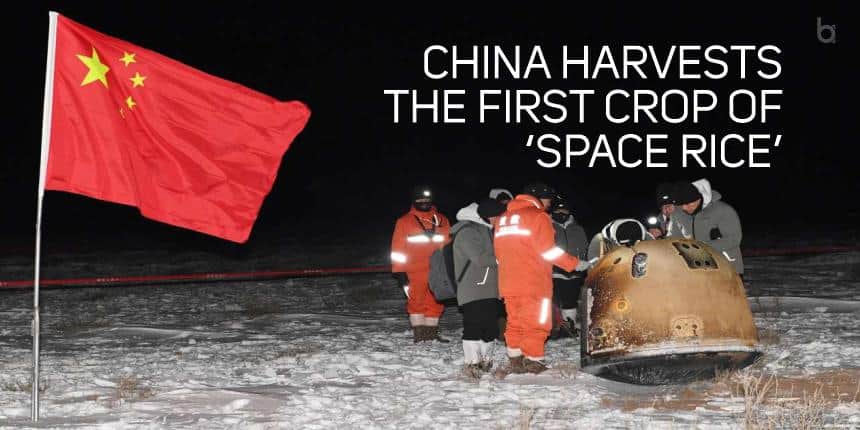Key Highlights:
- China’s first batch of rice seeds, which spent 23 days in space has begun to yield grain.
- Only high-yielding, high-quality varieties that show disease resistance would be formally recognized as stable types.
- The space seeds can also help China’s hybrid rice breeding.
Food Security Push
China’s first batch of rice seeds, which spent 23 days in space on the Chang’e-5 lunar probe in November 2020, has begun to yield grain, which analysts believe will enrich China’s grain varieties and ensure the country’s food security, as well as pave the way for future manned deep-space explorations to the moon, Mars, and other celestial bodies. After more than four months of growth, the dropping ears of the 2,000 “space rice plants” at the South China Agricultural University’s space breeding research center promise a fruitful harvest, as researchers bagged the seeds, each one centimeter long, into three large parcels.
Space rice in markets
The finest seeds will be grown in labs and then planted in fields, resulting in new rice varieties that are projected to raise China’s grain output and improve the breeding industry’s efficiency, according to Guo Tao, deputy head of the research center. The subject sparked intense debate among Chinese netizens, who questioned when the “rice from heaven” will be on their dinner tables. Guo said that it would probably take three to four years for the rice to reach the market.
“It will take a few more generations and go through a series of tests, comparisons and regional trials before passing provincial- and state-level reviews,” said Xu Lei, a rice breeding expert located in Panjin, Liaoning Province in Northeast China, one of China’s key rice production regions.
Only high-yielding, high-quality varieties that show disease resistance would be formally recognized as stable types that could be marketed countrywide, he said.
Hybrid Rice Breeding
According to Guo, the space seeds can also help China’s hybrid rice breeding. The seeds can supply more and better genetic sources to build the seed bank by using space breeding technologies to super hybrid rice.
“Space breeding has always been an unrelenting passion for scientists around the world to study the influence of cosmic rays, and a vacuum, microgravity space environment on organisms from the Earth,” said Wang Ya’nan, a space analyst and the head editor of Beijing-based Aerospace Knowledge magazine.
Rice seeds have traveled into deep space with the Chang’e-5 lunar probe, where a broader variety of challenges adds to the complexity of space breeding – but where the process produces more substantial genetic effects that improve public perception of life science in space, according to experts.
“With long-term human stays at the space station, researchers are hoping to conduct experiments to test a self-recycling ecosystem in space, which will greatly cut costs and reduce the resources needed for future manned spaceflights. This will support more deep-space explorations, including the building of a lunar research base and manned missions to Mars,” Wang said.
Also Read:- Outer Space discoveries! What are the new space expeditions to expect?






















